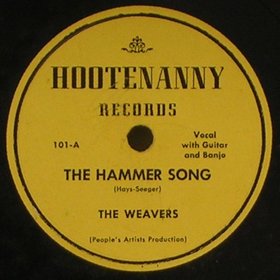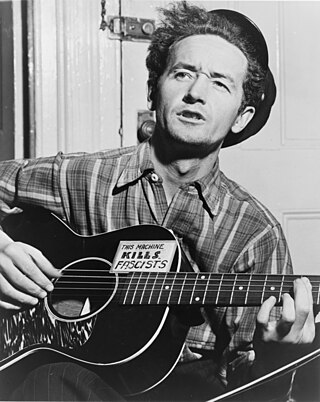
Peter Seeger was an American folk singer and social activist. He was a fixture on nationwide radio in the 1940s, and had a string of hit records during the early 1950s as a member of The Weavers, notably their recording of Lead Belly's "Goodnight, Irene," which topped the charts for 13 weeks in 1950. Members of the Weavers were blacklisted during the McCarthy Era. In the 1960s, Seeger re-emerged on the public scene as a prominent singer of protest music in support of international disarmament, civil rights, counterculture, workers' rights, and environmental causes.

Clyde Jackson Browne is an American rock musician, singer, songwriter, and political activist who has sold over 18 million albums in the United States.

Holly Near is an American singer-songwriter, actress, teacher, and activist.

The Wind is the twelfth and final studio album by American singer-songwriter Warren Zevon. The album was released on August 26, 2003, by Artemis Records. Zevon began recording the album shortly after he was diagnosed with inoperable pleural mesothelioma, and it was released just two weeks before his death on September 7, 2003. The album was awarded the Grammy Award for Best Contemporary Folk Album, and "Disorder in the House", performed by Zevon with Bruce Springsteen, won the Grammy for Best Rock Vocal Performance. Songs from the album were nominated for an additional three Grammys.

"If I Had a Hammer " is a protest song written by Pete Seeger and Lee Hays. It was written in 1949 in support of the Progressive movement, and was first recorded by the Weavers, a folk music quartet composed of Seeger, Hays, Ronnie Gilbert, and Fred Hellerman. It was a #10 hit for Peter, Paul and Mary in 1962 and then went to #3 a year later when recorded by Trini Lopez in 1963.

We Shall Overcome: The Seeger Sessions is the fourteenth studio album by Bruce Springsteen. Released in 2006, it peaked at number three on the Billboard 200 and won the Grammy Award for Best Traditional Folk Album at the 49th Grammy Awards.

Guy Davis is an American blues guitarist, banjo player, and two-time Grammy Award nominee. He is the second child and the only son of the actors Ruby Dee and Ossie Davis.

"The Ghost of Tom Joad" is a folk rock song written by Bruce Springsteen. It is the title track to his eleventh studio album, released in 1995. The character Tom Joad, from John Steinbeck's classic 1939 novel The Grapes of Wrath, is mentioned in the title and narrative.

The Bruce Springsteen with the Seeger Sessions Band Tour, afterward sometimes referred to simply as the Sessions Band Tour, was a 2006 concert tour featuring Bruce Springsteen and the Sessions Band playing what was billed as "An all-new evening of gospel, folk, and blues", otherwise seen as a form of big band folk music. The tour was an outgrowth of the approach taken on Springsteen's We Shall Overcome: The Seeger Sessions album, which featured folk music songs written or made popular by activist folk musician Pete Seeger, but taken to an even greater extent.
Smithsonian Folkways is the nonprofit record label of the Smithsonian Institution. It is a part of the Smithsonian's Smithsonian Center for Folklife and Cultural Heritage, located at Capital Gallery in downtown Washington, D.C. The label was founded in 1987 after the family of Moses Asch, founder of Folkways Records, donated the entire Folkways Records label to the Smithsonian. The donation was made on the condition that the Institution continue Asch's policy that each of the more than 2,000 albums of Folkways Records remain in print forever, regardless of sales. Since then, the label has expanded on Asch's vision of documenting the sounds of the world, adding six other record labels to the collection, as well as releasing over 300 new recordings. Some well-known artists have contributed to the Smithsonian Folkways collection, including Pete Seeger, Ella Jenkins, Woody Guthrie, and Lead Belly. Famous songs include "This Land Is Your Land", "Goodnight, Irene", and "Midnight Special". Due to the unique nature of its recordings, which include an extensive collection of traditional American music, children's music, and international music, Smithsonian Folkways has become an important collection to the musical community, especially to ethnomusicologists, who utilize the recordings of "people's music" from all over the world.

"Where Have All the Flowers Gone?" is a folk song written by American singer-songwriter Pete Seeger in 1955. Inspired lyrically by the traditional Cossack folk song "Koloda-Duda", Seeger borrowed an Irish melody for the music, and published the first three verses in Sing Out! magazine. Additional verses were added in May 1960 by Joe Hickerson, who turned it into a circular song. Its rhetorical "where?" and meditation on death place the song in the ubi sunt tradition. In 2010, the New Statesman listed it as one of the "Top 20 Political Songs".

The American folk music revival began during the 1940s and peaked in popularity in the mid-1960s. Its roots went earlier, and performers like Josh White, Burl Ives, Woody Guthrie, Lead Belly, Big Bill Broonzy, Richard Dyer-Bennet, Oscar Brand, Jean Ritchie, John Jacob Niles, Susan Reed, Paul Robeson, Bessie Smith, Ma Rainey and Cisco Houston had enjoyed a limited general popularity in the 1930s and 1940s. The revival brought forward styles of American folk music that had in earlier times contributed to the development of country and western, blues, jazz, and rock and roll music.

What's That I Hear?: The Songs of Phil Ochs is a 1998 tribute compilation to the music of the late Phil Ochs. The various performers cover several generations of Ochs' admirers. All profits from the album's sales were divided equally between the non-profits, the ACLU Foundation of Southern California and Sing Out! Magazine.

Folkways: A Vision Shared – A Tribute to Woody Guthrie & Leadbelly is a 1988 album featuring songs by Woody Guthrie and Lead Belly interpreted by leading folk, rock, and country recording artists. It won a Grammy Award the same year.
The Sessions Band is an American musical group that has periodically recorded and toured with American rock singer-songwriter Bruce Springsteen in various formations since 1997.

Casey Neill is an American musician. He leads Portland, Oregon-based band Casey Neill & The Norway Rats, singing with a raspy vocal quality and playing electric and acoustic guitars. Neill's style, folk-punk, mixes influences from punk, Celtic and folk music, and has been compared to R.E.M. and The Pogues.

At 89 is a studio album by Pete Seeger, released on September 30, 2008, via Appleseed Records. In 2008, the album earned Seeger the Grammy Award for Best Traditional Folk Album.
Francis Moreland Warner was an American folk song collector, singer, musician, and YMCA executive. He and his wife Anne Warner collected and preserved many previously unpublished traditional song versions from the eastern United States, including "Tom Dooley", "He's Got the Whole World in His Hands", "The Days of Forty-Nine", and "Gilgarrah Mountain", a New Hampshire version of the song more widely known as "Whiskey in the Jar".

Tom Paxton is an American folk singer-songwriter who has had a music career spanning more than fifty years. In 2009, Paxton received a Grammy Lifetime Achievement Award. He is noteworthy as a music educator as well as an advocate for folk singers to combine traditional songs with new compositions.
Jeff Place is the American writer and producer, and a curator and senior archivist with the Smithsonian Center for Folklife and Cultural Heritage. He has won three Grammy Awards and six Indie Awards.














